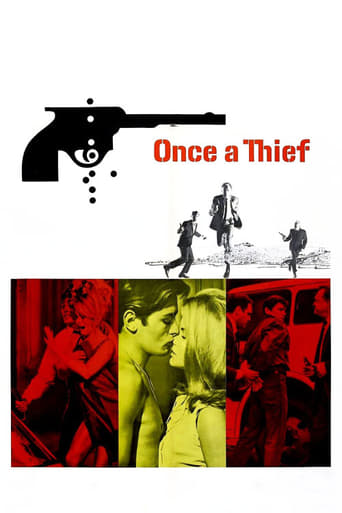MARIO GAUCI
In the wake of having watched Alain Delon in Joseph Losey's THE ASSASSINATION OF TROTSKY (1972), I decided to check out three other vehicles of his I had taped off TV over the last few months – beginning with this one, which emerges to be just as pretentious as Losey's film! Best described as a beatnik noir, we've seen this film's story told a million times before – that of a criminal who can't escape his past, dogged as much by old associates as by an obsessive police nemesis. Consequently, director Nelson and cinematographer Robert Burks (best-known for his longtime collaboration with Alfred Hitchcock) handle the generally clichéd material for more than it's worth – even if my viewing was somewhat compromised by the film being panned-and-scanned.Delon and Ann-Margret make for a handsome couple - although she occasionally tries too hard and her histrionics seem more at home in a Tennessee Williams melodrama; Van Heflin is appropriately world-weary as the aging cop, Jack Palance is typically intense as a crime boss and Delon's elder brother. The rest of Palance's gang is made up of the odd-looking and memorably creepy John Davis Chandler and Tony Musante – while Jeff Corey appears as Heflin's irate superior. The film's screenwriter Zekial Marko (adapting his own novel) is featured in an unintentionally hilarious supporting role as a druggie who shares a cell with Delon – we follow his case intermittently throughout (for no very good reason other than to justify the similarly hapless Delon's pursuit of crime) via newspaper clippings, denoting Marko's conviction to the gas chamber and eventually his suicide! The film is aided by a jazzy score courtesy of Lalo Schifrin, who seemed to specialize in crime/police dramas. The elaborate heist half-way through is an expected highlight, which then leads to a predictably downbeat and body-strewn climax.
jt1999
The beginning of this picture, from the jazzy opening credits and into the next reel or so, is rather engaging. At its best, it is stylish in that French New Wave Meets American Beatnik kind of way, frequent in popular culture of the time. The dialogue is peppered with hepcat slang and frank references to narcoticsand so-called "deviant" sexuality. This is daring stuff for a 1965 release from MGM. Beautiful widescreen black-and-white photography from Robert Burks,who had by then done several Hitchcock films. The steady hand of directorRalph Nelson keeps the picture moving, often punctuated by moments ofunexpected brutality. PC this is not! The story itself is popcorn stuff, perhaps best not explored too deeply, but a great cast helps to enliven the material. Bytoday's standards, the character played by Ann-Margret would never bedepicted in such a fashion as seen here. (At one point, she apologizes afterbeing slapped around.) But hey, she's under the seductive spell of Alain Delon, a Frenchman playing an Italian. No, it's not "The Asphalt Jungle". Neither is it a total waste of time, as it's often described as being. It's a good example of a mid- '60s studio potboiler, capably and professionally (and sometimes artfully)handled by all parties concerned. If your bag lies elsewhere, go on and fetch it, then. I'm rewinding the tape so I'll be ready to watch "Once a Thief" again soon.
azignon
I am living in France now and have seen repeats of this film on TV. Alain Delon and Van Heflin keep getting better and better each time I see the film. Ann Margaret is soooooo bad and gets worse and worse. The little girl is obnoxious. It is all predictable but Delon and Heflin make it worthwhile. I wish I had seen the film in the sixties. It would have been interesting comparing my reactions to the film in different time periods.
gvb0907
The plot is threadbare, the principals don't really look the part, the pace is much too slow, but this film still has some points of interest.First, the location work. Plenty of San Francisco footage, though much of it at night (this is film noir, after all). The city looks different now, but many of the setups are in areas that haven't changed too much.Then there's Anne-Margret, still in her sex-kitten stage but trying hard to break out of it. She's really not up to the mommy part, though she gives it a good try. Her character is about the only sympathetic one in the film, save . . .Van Heflin's. I've always liked him. He's pretty good as the cop who hounds Delon, though he won't pass for Italian any day of the week, or will Delon, for that matter. It's interesting to contrast this detective with Steve McQueen's Frank Bullit or Clint Eastwood's Harry Callahan. They're all SFPD and only a few years separate their stories, but Heflin's Mike Vido is from another world. Wait until you see who he lives with.And then there's John David Chandler's homicidal homosexual-child molester, a really nasty characterization you won't encounter today and not often then. Oh yes, he's also a sadist.Finally, there's Jack Palance's equal opportunity crew: two Italians (though I think their surname is Croatian), a Jew, a Greek, and a Chinese undertaker. Somehow they pull off the heist, though just barely.Recommended if you enjoy hard-core noir, Anne-Margret, or Heflin, otherwise steer clear.



